


NOVEMBER 24, 2020
Opening Plenary
POSITIONING THE ECONOMY FOR THE NEXT NORMAL
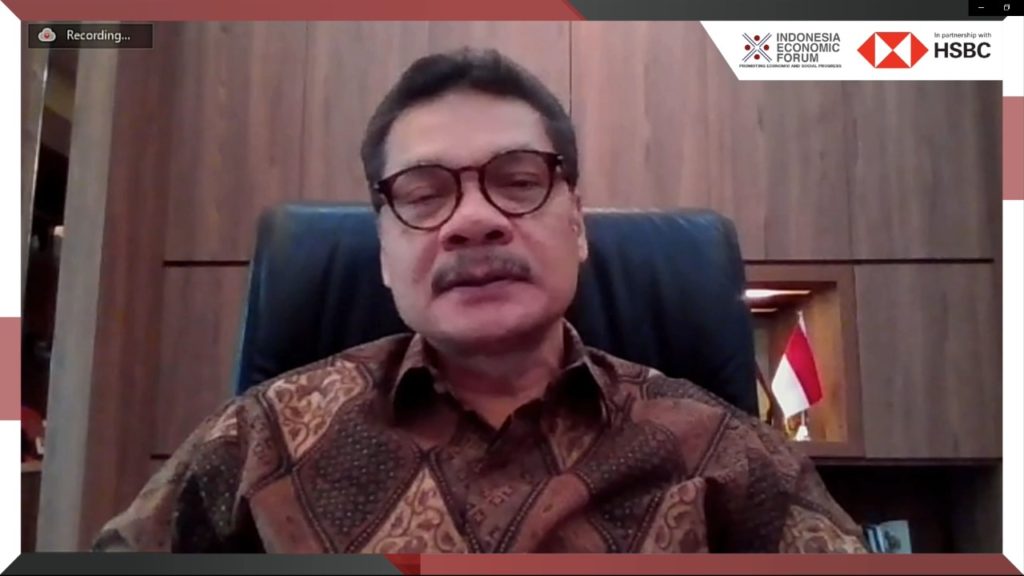
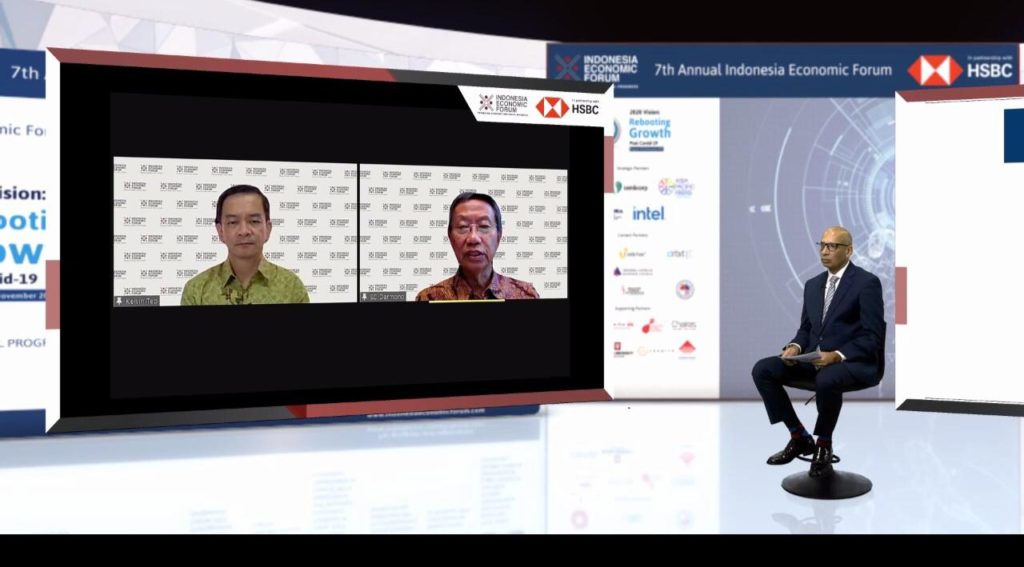
Opening Address: Francois de Maricourt, President Director, HSBC Indonesia
Keynote Address: Iskandar Simorangkir, Deputy for Macroeconomic and Finance Coordination, Coordinating Ministry of Economic Affairs
Panelist:
• SD Darmono, Chairman Jababeka Group
• Kelvin Teo, CEO Sembcorp Development
As Indonesia emerges from the covid-19 pandemic, business leaders have begun to position their companies and businesses to take advantage of the new opportunities. In his opening address, Francois de Maricourt, President Director HSBC Indonesia said in recent months, the government of Indonesia has been making commendable progress in placing a higher focus and priority in attracting manufacturing investments. With the recently signed Regional Comprehensive Economic Partnership (RCEP), Indonesia will benefit from increased exports to other member countries given the region’s growing share of global GDP over time and the effect of deeper liberalization.
During his keynote speech, Iskandar Simorangkir, Deputy for Macroeconomic and Finance Coordination, Coordinating Ministry of Economic Affairs said the government will continue its commitment for structural reform in the long run, through the Omnibus Law on Job Creation. It is expected to improve the business and investment climate, making sure the continuity of business operations and reducing impact of Covid-19 such as job losses.
During the panel discussion, SD Darmono, Chairman of Jababeka Group emphasized the impact of Omnibus Law on Job Creation that will bring new foreign direct investment. But Indonesia needs to understand the motivation of each investor as investors from Japan have different needs from South Korean, Chinese or Taiwanese investors. In addition, investors today are also showing greater interest in ESG projects.
Kelvin Teo, CEO of Sembcorp Development said that Covid-19 has strengthened integration within Asian countries and with the newly RCEP agreement, can bring more investment, supply chain and manufacturing to the region. Particularly Indonesia, Vietnam and Myanmar could be preferred destinations for North Asian investors. Indonesia, he noted, as an opportunity to become a new manufacturing base for the region.
Afternoon Session 1
RESHAPING THE GLOBAL ECONOMY: 5 KEY FACTORS
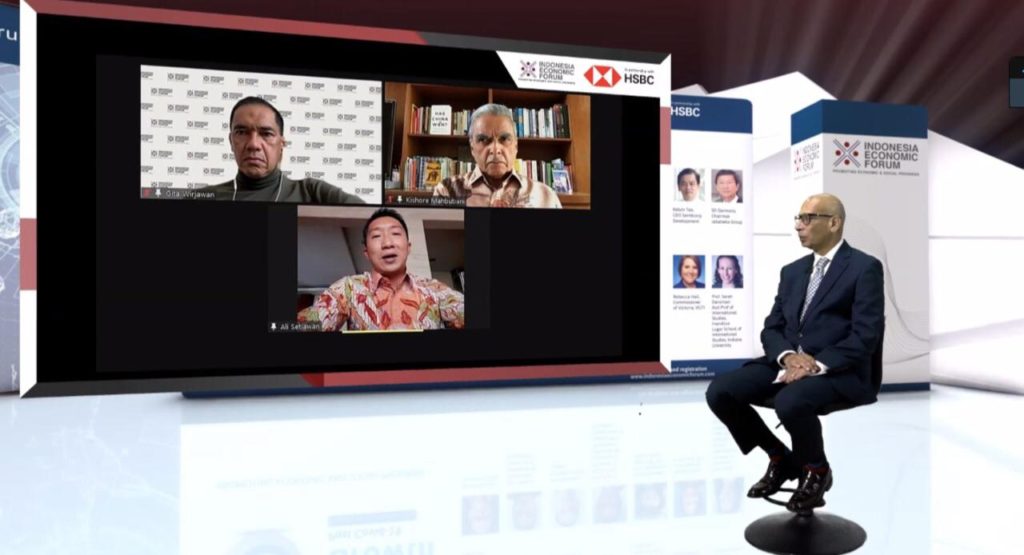
Panelist:
• Prof. Kishore Mahbubani, Distinguished Fellow, NUS (Singapore)
• Gita Wirjawan, Founder Ancora Capital
• Ali Setiawan, Head Of Global Markets PT Bank HSBC Indonesia
With the severe disruption to the global economy brought about by Covid-19 and the ongoing trade war between the US and China, the three distinguished panelists key provided insights on the outlook for 2021. Prof. Kishore Mahbubani, Distinguished Fellow, NUS (Singapore) noted that the ongoing economic and political standoff between the world’s two largest economies will continue to color the geopolitical landscape in 2021. China’s economy is already on the road to recovery and that bodes well for Southeast Asia. Gita Wirjawan, Founder Ancora Capital added that Indonesia, with its stable geopolitical outlook, the new Omnibus Law on Job Creation and the positive impact of RCEP, will enjoy more FDIs and economic growth in coming years.
Ali Setiawan, Head Of Global Markets PT Bank HSBC Indonesia added that the Indonesian government needs to stay proactive and consistent in terms of implementing policies and incentives to boost economic recovery in 2021. In fact, Indonesia was still among the most attractive markets in ASEAN in 2020, attracting strong foreign capital flows in the first half of the year.
Afternoon Session 2
Special Presentation: THE FUTURE OF WORK
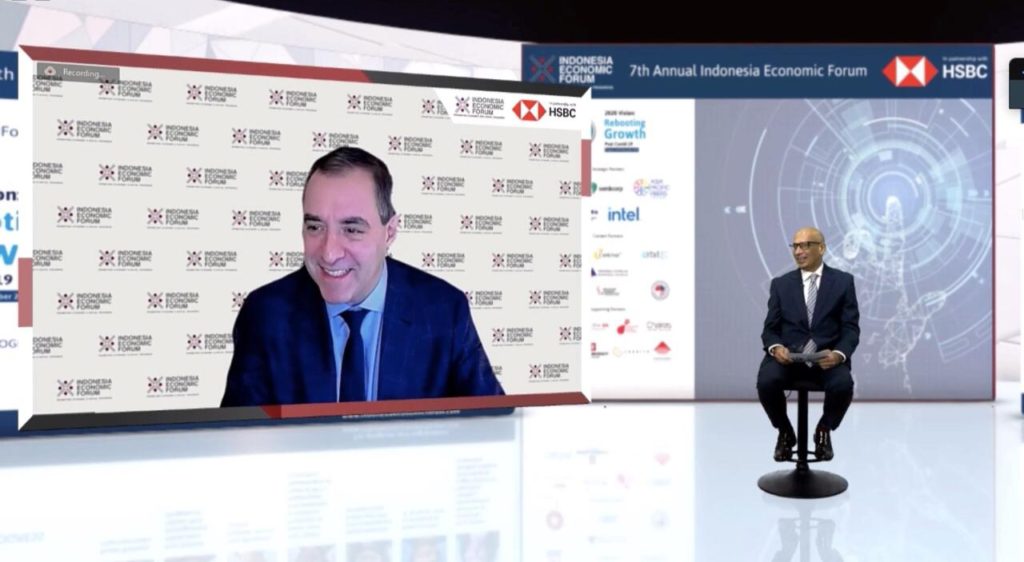
Panelist: Prof. David Autor,
Ford Professor of Economics and associate department head of MIT’s Department of Economics
Prof. David Autor, Ford Professor of Economics and associate department head of MIT’s Department of Economics highlighted how technology has over the past 200 years disrupted and created new jobs. From the industrial revolution to today’s IT revolution, human society has continued to progress and create new job opportunities.
The key, he noted, is not to worry about automation replacing human labor but to focus on improving skills in problem solving, creativity and adaptation and mastering their field. New jobs that we cannot imagine today will be created in the future. AI will not replace human creativity and judgment.
Video Highlights
François de Maricourt,
President Director PT Bank HSBC Indonesia
Kelvin Teo,
CEO Sembcorp Development
SD Darmono,
Chairman of Jababeka Group
Ali Setiawan,
Head of Global Markets PT Bank HSBC Indonesia
NOVEMBER 25, 2020
Morning Session
EMERGING TRENDS IN GLOBAL TRADE
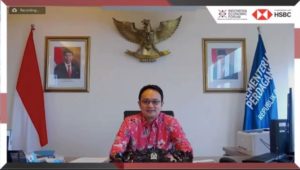

Keynote Address: Dr. Jerry Sambuaga,
Vice Minister of Trade, RI
Special Address: Prof. Sarah Danzman,
Asst. Prof of International Studies, Hamilton Lugar School of International Studies, Indiana University, Bloomington
Panelist:
• Dr. Lili Yan Ing, Lead Advisor, Economic Research Institute for ASEAN
• Shinta Kamdani, Vice Chairperson Kadin
In his keynote address, Dr. Jerry Sambuaga, Vice Minister of Trade, RI said Indonesia can improve its position in the global supply chain through the recently signed Regional Comprehensive Economic Partnership (RCEP). RCEP is the second largest trade agreement for ASEAN countries after the WTO and will improve economic growth in the region.
During the panel discussion, Prof. Sarah Danzman, Asst Prof of International Studies, Hamilton Lugar School of International Studies, Indiana University, US said that international material trade is still facing challenges as the newly elected US president reformulates the country’s international trade policy. Vice Chairwomen KADIN Shinta Kamdani said the Indonesian government needs to implement its policies more actively, not just designing the policy well so that Indonesia can be competitive among its regional peers. Dr. Lili Yan Ing, Lead Advisor, Economic Research Institute for ASEAN and East Asia said the government should also focus on improving society’s quality of life, health and education.
Afternoon Session 1
REVITALISING INDONESIA’S TEXTILE INDUSTRY: SOS!

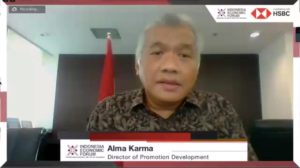
Keynote Address: Alma Karma,
Director of Promotion Development, Indonesia Investment Coordination Board
Panelist:
• Ravi Shankar, President Director Asia Pacific Fibers and Chairman of APSyFi
• Jemmy Kartiwa Sastraatmaja, Chairman of Indonesian Textiles Association
• Didik J. Rachbini, Senior Economist Institute for Development of Economics and Finance
Indonesia’s textile industry has played a pivotal role in the country’s industrial development over the past five decades. But over the past ten years, it has faced many challenges, both internal and external. In his keynote speech, Alma Karma, Director of Promotion Development, Indonesia Investment Coordination Board said during the first nine months of 2020, the agency attracted investment commitment up to Rp 616.6 trillion, or about 78% of 2020’s target of Rp 817.2 trillion.
Ravi Shankar, President Director Asia Pacific Fibers and Chairman of APSyFi said that currently Indonesia’s textile performance lags behind those of China and India, where the industry plays a bigger role in GDP. Indonesian textile exports reached US$12 billion and imports reached US$9.4 billion with contribution to GDP up to 3%. While exports have been muted in the last few years, imports have increased. As such, the industry is in urgent need to be revitalized by improving import substitution policies, increasing export and optimizing the domestic market. In addition, integration and collaboration with the investment agency will increase textile exports upto US$30 billion.
Jemmy Kartiwa Sastraatmaja, Chairman of Indonesian Textiles Association said the textile industry needs to be revitalized through policies that can help reduce the cost of production so as to be more competitive. In the last five years, there has been no policy from the government to control the price of primary commodities particularly from countries that sell their goods at much lower prices.
Didik J. Rachbini, Senior Economist Institute for Development of Economics and Finance said Indonesia commodity exports only amounted to US$12.9 billion and were still below other Asia countries such as Vietnam, Bangladesh, India and Turkey. In 2020, exports are expected to decrease to between US$10 to US$11 billion. While other countries still target Indonesia to market their products, Indonesia needs to increase its capability in international marketing.
Afternoon Session 2
SUSTAINABLE FINANCE: A NEW PATHWAY TO GROWTH
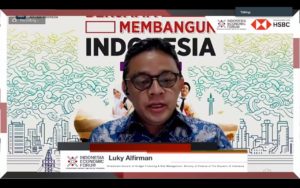
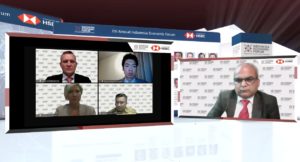
Keynote Address: Luky Alfirman,
Director General of Budget Financing and Risk Management, Ministry of Finance of The Republic of Indonesia
Panelist:
• Sean Henderson, Managing Director,CoHead of Debt Capital Markets Asia Pacific HSBC
• Isabel Chatterton, Regional Industry Director, Infrastructure and Natural Resources, Asia and Pacific, International Finance Corporation (IFC)
• Mervyn Tang, Senior Director and Global Head of ESG Research, Fitch Ratings
• Hendro Utomo, Rating Director, Pefindo Rating Agency
As the demand for sustainable finance products continues to grow, Indonesia should leverage on this trend, a panel of experts noted in the discussion.
During his keynote speech, Luky Alfirman, Director General of Budget Financing and Risk Management, Ministry of Finance said that there is currently no price incentive for sustainable finance product issuers. To reduce gas emissions up to 29% by 2030, Indonesia need least Rp3,461 trillion (US$247 billion) ESG financing, while government so far only issued Rp370 trillion (US$26 billion) financing over the 2016-2019 state budget.
During panel discussion, Sean Henderson, Managing Director & Co Head of Debt Capital Markets Asia Pacific, HSBC said that the sustainable bond market has grown significantly from only US$16 billion in 2014 to US$ 110 billion in 2019. HSBC was glad to be part of the very first green bond Issuance by the Indonesian government and hopes to continue to contribute further to the government’s goals towards poverty reduction, improving education and lowering pollution.
Isabel Chatterton, Regional Industry Director, Infrastructure and Natural Resources, Asia and Pacific, International Finance Corporation (IFC) said IFC has so far issued US$10.4 billion green bonds in 20 currencies to finance 220 projects that is expected to reduce emission around 2.5 billion cubic gasoline. Mervyn Tang, Senior Director and Global Head of ESG Research, Fitch Ratings said APAC region still offers many areas for sustainable financing such as sustainable forestry. Hendro Utomo, Rating Director at Pefindo Rating Agency said not many Indonesian corporates have issued green bonds which points to future scope for growth.
Media Coverage
Video Highlights
Ravi Shankar,
President Director Asia Pacific Fibers
Sean Henderson,
Managing Director & Co Head of Debt Capital Markets Asia Pacific HSBC
NOVEMBER 26, 2020
Morning Session
FOSTERING CONNECTION AND STRENGTHENING RELATIONS; A HIGHER EDUCATION DIALOGUE TOWARDS A SUCCESSFUL IA-CEPA


Opening Address: Rebecca Hall,
Commissioner of Victoria, VGTI
Keynote Address:Bambang Brodjonegoro, PhD,
Minister of Research and Technology, Republic of Indonesia
Panelist:
• Dra. Gracia Shinta Ugut, MBA, PhD, Dean of Faculty of Business and Economics, Pelita Harapan University
• Diah Wihardini, PhD, BINUS Global Director, BINUS University
• Baiduri Widarnako, PhD, Head of International Office, Universitas Indonesia
• Prof. Andrew MacIntyre, Senior Pro Vice-Chancellor (SEA Partnerships), Monash University
• Prof Vedi Hadiz, FASSA Director and Professor of Asian Studies, University of Melbourne
• Prof. Iain Martin, Vice-Chancellor of Deakin University
• Prof. Reini Wirahadikusumah, PhD, the Rector of Institut Teknologi Bandung
The Indonesia-Australia Comprehensive Economic Cooperation Agreement (IA-CEPA) marks a new chapter of bi-lateral relationship between the two countries. Greater cooperation in higher education is one of the top priorities listed under the agreement.
In her opening remarks, Rebecca Hall, Commissioner of VGTI, said relations between Indonesian and Australian universities are already close given that Australian institutions of higher learning such as Deakin University, Monash University and University of Melbourne are working closely with their Indonesian counterparts such as Universitas Indonesia, Institut Teknologi Bandung, Universitas Pelita Harapan and BINUS. VGTI wants to extend the collaboration beyond education to research and skills set.
In his keynote speech, Bambang Brodjonegoro, Minister of Research and Technology said research, innovation and collaboration among higher education institutions play a critical role achieving the government’s vision 2045 of becoming a developed country and escaping the middle income trap. The discussion invited several speakers to share their experience and thoughts on higher education collaboration between Indonesian and Australian campuses.
Afternoon Session 1
THE AGRI-TECH REVOLUTION: A RECESSION-PROOF FUTURE FOR INVESTORS?


Keynote Address: Sandiaga S. Uno,
Founder Inotek Foundation & Seribu Teknopreneur Sejuta Pekerjan (STSP)
Panelist:
• Prof. Kudang Boro Seminar, Professor and Dean, Department of Mechanical & Biosystem Engineering & the Computer Science Department, Agricultural Institute Bogor (IPB), Indonesia
• Edward Chamdani, Co-Founder & Managing Partner, Ideosource VC and Gayo Capital, Indonesia
• Chinnu Senthilkumar, General Partner & CTO at Exfinity Venture Partners
• Vijay Sambamurthi, Founder and Managing Partner, Lexygen
In his keynote address, Sandiaga S Uno, Founder of Inotek Foundation & Seribu Teknopreneur Sejuta Pekerjan (STSP) said during the pandemic, food had become the new internet. With technological intervention, Indonesian farmers could improve domestic food security and multiply local production capacity in term of seed, fertilizer and overall efficiency.
During panel discussion, Prof. Kudang Boro Seminar, Professor and Dean, Department of Mechanical & Biosystem Engineering & the Computer Science Department, Agricultural Institute Bogor (IPB) said that with the intervention of technology, the agri-industry can be introduced to millennials. Edward Chamdani, Co-Founder & Managing Partner, Ideosource VC and Gayo Capital, Indonesia said many agritech startups currently are too focused on the downstream instead of upstream agriculture. Vijay Sambamurthi, Founder and Managing Partner, Lexygen said agritech in Indonesia should focus on “intermediate ties the whole sector” to directly connect farmers with consumers. Chinnu Senthilkumar, General Partner & CTO at Exfinity Venture Partners also agreed with Prof. Kudang Boro, noting that industry needs to bring millennials into agribusiness to help most of the old farmers adopt technology.
Afternoon Session 2
AI, IoT, CLOUD & BIG DATA: THE NEW FRONTIER
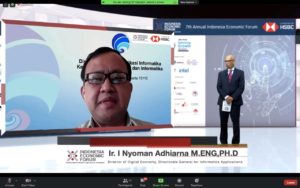

Keynote Address: Ir. I Nyoman Adhiarna M.Eng, PhD,
Director of Digital Economy, Directorate General for Informatics Applications, Ministry of Communication and Informatics
Panelist:
• Dr. -Ing. Ilham A Habibie, Chief Executive, National ICT Council, Republic of Indonesia
• Mark Burby, Regional Sales Director, Asia Pacific Growth & Emerging Markets, Intel Corporation
• Gregory Hendra Lembong, Director of Information Technology & Enterprise Security, PT Bank Central Asia Tbk
• Poonam Sagar, Director PT Infotech Solutions
With the growth of technology such as AI, Big Data and Cloud impacting all walks of life and every industry, Indonesia needs to invest heavily and sustainably in IT infrastructure. During his keynote, Ir. I Nyoman Adhiarna, Director of Digital Economy, Directorate General for Informatics Applications, Ministry of Communication and Informatics said that the government wants to make sure the national data center can support governance and data integration initiatives. Without decent infrastructure, the adoption of technology will not be effective.
Dr. -Ing. Ilham A Habibie, Chief Executive, National ICT Council said Indonesia needs good digital leadership and full command strategy to avoid overlapping policies in digital transformation. Both the government and the private sector need to step up their collaboration. Mark Burby, Regional Sales Director, Asia Pacific Growth & Emerging Markets, Intel Corporation said the pandemic has pushed us collectively to evaluate our priorities and find ways to survive. During the new normal, technology qill play an essential role and all of society should innovate to improve productivity by leveraging transformative technologies such as AI, Machine Learning, AR, VR, Robotics and cloud.
Gregory Hendra Lembong, Director of Information Technology & Enterprise Security, PT Bank Central Asia Tbk said the lender has been embedding technology in their operations such us to count money and mobile banking. Poonam Sagar, Director PT Infotech Solutions said the majority of companies are having a setback in terms of revenue but they can leverage information and technology to overcome the challenge.
Afternoon Session 3
NEW INVESTMENT TRENDS


Special Address: James Castle,
Founder Castle Asia
Panelist:
• Lin Neumann, CEO, AmCham
• George Iwan Marantika, President, Indonesia Australia Business Council
• Joel Shen, Vice Chairman, Singapore Chamber of Commerce Indonesia
• Gurjit Singh, Former Ambassador of India to Indonesia and ASEAN
The session discussed new investment trends emerging around the world and how Indonesia should adapt and benefit from this. In his special address, James Castle, Founder Castle Asia said the government needs to have more open dialogue about the Omnibus Law on Job Creation and communicate the logic behind the change in a much better way so that public and investors can understand it.
Lin Neumann, CEO, AmCham said a apart from the natural resource sector which continues to be a challenge, Amcham see some really good investments coming into Indonesia, such a large US chemical company that is investing a couple billion dollars in South Kalimantan and a coal gasification plant that fits perfectly with the methane demand for biodiesel are great investment. The acquisition by Kimberly Clark of Softex was a great indication of renewed US investor interest in Indonesia and Indonesian companies readiness to work with foreign investors.
George Iwan Marantika, President of the Indonesia Australia Business Council said 2021 could be an important year for investing in Indonesia especially in education and the digital economy. The investment traffic form Australia to Indonesia, or the collaboration/ consortium between American Australia companies coming into Indonesia in sectors like e-commerce in increasing So 2021 will be very interesting to look forward because President Joko Widodo himself is banking on the digital economy to push national economy recovery.
Joel Shen, Vice Chairman, Singapore Chamber of Commerce Indonesia said investors are welcoming the idea of Omnibus Law on Job Creation in general, but some are also rather skeptical on the implementation level. In terms of digital economy, venture capital firms are still investing heavily in Indonesia amidst the Covid-19 pandemic and there is no decline in terms of frequency and volume or the size.
Gurjit Singh, Former Ambassador of India to Indonesia and ASEAN said it is normal if government facing protest against Omnibus Law because it shows that the government is finally getting something right for the business. Government has to take steps in the right direction to reform the economy. India has seen that things too. And India business community hopes the bill will address issues that they have raised.
Media Coverage
Video Highlights
Rebecca Hall,
Commissioner of Victoria, VGTI
Mark Burby,
Regional Sales Director, Asia Pacific Growth & Emerging Markets, Intel Corporation
James Castle,
Founder Castle Asia
IEF 2020 Highlights

